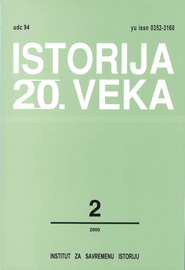JUGOSLOVENSKO-SOVJETSKI ODNOSI U 1956. I MAĐARSKA KRIZA U IZVEŠTAJIMA BRITANSKIH DIPLOMATA U BEOGRADU
YUGOSLAV-SOVIET RELATIONS IN 1956 AND THE HUNGARIAN CRISIS IN BRITISH DIPLOMATIC REPORTS IN BELGRADE
Author(s): Svetozar RajakSubject(s): Diplomatic history, Political history, Recent History (1900 till today), Post-War period (1950 - 1989), History of Communism
Published by: Institut za savremenu istoriju, Beograd
Keywords: Yugoslavia; USSR; 1956; diplomacy; foreign policy; British diplomats; Sir Robert; USSR; Hungarian crisis;
Summary/Abstract: The year 1956 represented without doubt the most turbulent period after the break in Yugoslav-Soviet relations in 1948. As Sir Roberts pointed out in his annual report, the history of diplomacy knows of few cases in which relations between two countries have gone from one extreme to the other in such a short time. While observing the course of these events, despite pressure caused by the deterioration of their country’s relations with Yugoslavia, British diplomats, especially the ambassador Sir Roberts, succeeded in offering a sound interpretation of the character of the relations and the motives influencing the decisions made by the Yugoslav and Soviet leaders. Often their assessments of the true state of affairs in Yugoslav-Soviet relations and their opinions regarding the future of these relations disagreed with the views of their superiors in London. Actual events regularly confirmed, however, the opinions of the diplomats in Belgrade. A study of the reports of British diplomats arriving from Belgrade in the course of 1956 indicates scarce coverage of the events involving Hungary in the first half of November. Sir Roberts’ absence from Belgrade during this period certainly played an important part in this. Consequently, in the first, deciding days of the Hungarian crisis there was no one to send the brilliant political analyses, based on close contacts with Yugoslav leaders, which this exceptional diplomat otherwise regularly dispatched from Belgrade. It is the author’s guess that in this period communication between the British diplomats in London and Belgrade was limited to purely informative reports, which unfortunately are still unavailable for research. Nevertheless, as shown in this article, the quality primarily of Sir Roberts’ analyses made before and after this short period, present in an exceptionally comprehensive form the Western interpretation of Yugoslav-Soviet relations in 1956 and at the time of the Hungarian crisis.
Journal: Istorija 20. veka
- Issue Year: 2000
- Issue No: 2
- Page Range: 83-98
- Page Count: 16
- Language: Serbian

